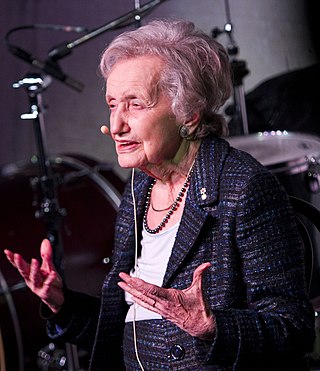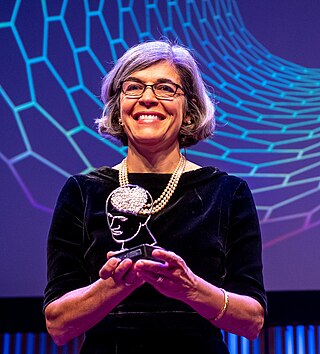Related Research Articles

Dementia is a disorder which manifests as a set of related symptoms, which usually surfaces when the brain is damaged by injury or disease. The symptoms involve progressive impairments in memory, thinking, and behavior, which negatively affects a person's ability to function and carry out everyday activities. Aside from memory impairment and a disruption in thought patterns, the most common symptoms include emotional problems, difficulties with language, and decreased motivation. The symptoms may be described as occurring in a continuum over several stages. Consciousness is not affected. Dementia ultimately has a significant effect on the individual, caregivers, and on social relationships in general. A diagnosis of dementia requires the observation of a change from a person's usual mental functioning and a greater cognitive decline than what is caused by normal aging.

Brenda Milner is a British-Canadian neuropsychologist who has contributed extensively to the research literature on various topics in the field of clinical neuropsychology. Milner is a professor in the Department of Neurology and Neurosurgery at McGill University and a professor of Psychology at the Montreal Neurological Institute. As of 2020, she holds more than 25 honorary degrees and she continued to work in her nineties. Her current work covers many aspects of neuropsychology including her lifelong interest in the involvement of the temporal lobes in episodic memory. She is sometimes referred to as the founder of neuropsychology and has been essential in its development. She received the Balzan Prize for Cognitive Neuroscience in 2009, and the Kavli Prize in Neuroscience, together with John O'Keefe, and Marcus E. Raichle, in 2014. She turned 100 in July 2018 and at the time was still overseeing the work of researchers.

Ian John Deary OBE, FBA, FRSE, FMedSci is a Scottish psychiatrist known for work in the fields of intelligence, cognitive ageing, cognitive epidemiology, and personality.
Trevor William Robbins CBE FRS FMedSci is a Professor of cognitive neuroscience and former Head of the Department of Psychology at the University of Cambridge. Robbins interests are in the fields of cognitive neuroscience, behavioural neuroscience and psychopharmacology.
Elizabeth Kerr Warrington FRS is a British neuropsychologist specialised in the study of dementia. She holds a PhD in Psychology visual processing and is now an emeritus professor of clinical neuropsychology at the University College London. She formerly worked as the Head of the Department of Neuropsychology at the National Hospital for Neurology and Neurosurgery where she is also a member of the Dementia Research Centre. She was made a Fellow of the Royal Society in 1986.

Anna Christina Nobre FBA, MAE, fNASc is a Brazilian and British cognitive neuroscientist working at the University of Oxford in England.

Alzheimer's disease (AD) is a neurodegenerative disease that usually starts slowly and progressively worsens. It is the cause of 60–70% of cases of dementia. The most common early symptom is difficulty in remembering recent events. As the disease advances, symptoms can include problems with language, disorientation, mood swings, loss of motivation, self-neglect, and behavioral issues. As a person's condition declines, they often withdraw from family and society. Gradually, bodily functions are lost, ultimately leading to death. Although the speed of progression can vary, the typical life expectancy following diagnosis is three to nine years.
Samuel E. Gandy, M.D., Ph.D. is a neurologist, cell biologist, Alzheimer's disease (AD) researcher and expert in the metabolism of the sticky substance called amyloid that clogs the brain in patients with Alzheimer's. His team discovered the first drugs that could lower the formation of amyloid.
Mark A. Gluck is a professor of neuroscience at Rutgers–Newark in New Jersey, director of the Rutgers Memory Disorders Project, and publisher of the public health newsletter, Memory Loss and the Brain. He works at the interface between neuroscience, psychology, and computer science, studying the neural bases of learning and memory. His research spans numerous methodologies, including neurocomputational modeling, clinical studies of brain-damaged patients, functional and structural brain imaging, behavioral genetics, and comparative studies of rodent and human learning. He is the co-author of Gateway to Memory: An Introduction to Neural Network Models of the Hippocampus and an undergraduate textbook Learning and Memory: From Brain to Behavior.
Barbara Jacquelyn Sahakian, is Professor of Clinical Neuropsychology at the Department of Psychiatry and Medical Research Council (MRC)/Wellcome Trust Behavioural and Clinical Neuroscience Institute, University of Cambridge. She is also an Honorary Clinical Psychologist at Addenbrooke's Hospital, Cambridge. She has an international reputation in the fields of cognitive psychopharmacology, neuroethics, neuropsychology, neuropsychiatry and neuroimaging.

Karen Elizabeth Keitley Duff is a British scientist known for her work on Alzheimer's disease. Her most notable work focused on the development and characterization of mouse models of Alzheimer's disease amyloid deposition. She became Centre Director of the UK Dementia Research Institute's hub at University College London in Spring 2020.
Usha Claire Goswami is a researcher and professor of Cognitive Developmental Neuroscience at the University of Cambridge, a Fellow of St. John's College, Cambridge, and the director of the Centre for Neuroscience in Education, Downing Site. She obtained her Ph.D. in developmental psychology from the University of Oxford before becoming a professor of cognitive developmental psychology at the University College London. Goswami's work is primarily in educational neuroscience with major focuses on reading development and developmental dyslexia.

Rosalind Ridley is a British psychologist and researcher who was head of the Medical Research Council Comparative Cognition Research Team in the Department of Psychology, Cambridge, UK, until 2005. She was a fellow of Newnham College, Cambridge from 1995–2010 and Vice-Principal from 2000–2005. She holds the privileges of a Fellow Emerita at Newnham College.

The UCL Division of Psychology and Language Sciences is a Division within the Faculty of Brain Sciences of University College London (UCL) and is located in London, United Kingdom. The Division offers teaching and training and undertakes research in psychology and communication and allied clinical and basic science. It is the largest university psychology department in England.

Giovanna Rachele Mallucci is van Geest Professor of Clinical Neurosciences at the University of Cambridge in England and associate director of the UK Dementia Research Institute at the University of Cambridge. She is a specialist in neurodegenerative diseases.

Miia K. Kivipelto is a Finnish neuroscientist and professor at the University of Eastern Finland and Karolinska Institute in Stockholm. Her research focuses on dementia and Alzheimer's disease.
Jennifer J. Manly is an American neuropsychologist. She is a Professor of Neuropsychology in Neurology at the Gertrude H. Sergievsky Center and the Taub Institute for Research in Aging and Alzheimer's Disease at Columbia University. Manly studies how race, culture, socioeconomic status, and education influence the risk of cognitive decline in aging.

Andrew E. Budson is an American neurologist, academic and researcher. He is a Professor of Neurology at Boston University School of Medicine, Lecturer in Neurology at Harvard Medical School, Chief of Cognitive and Behavioral Neurology and Associate Chief of Staff for Education at the Veterans Affairs (VA) Boston Healthcare System, where he also serves as a Director of the Center for Translational Cognitive Neuroscience. He is Associate Director and Outreach, Recruitment, and Engagement Core Leader at the Boston University Alzheimer’s Disease Research Center.

Keenan A. Walker, Ph.D., directs the Multimodal Imaging of Neurodegenerative Disease unit in the Laboratory of Behavioral Neuroscience at the National Institute on Aging. His research includes studies on Alzheimer's disease.
References
- ↑ "Professor Zoe Kourtzi". University of Cambridge. 22 October 2013. Retrieved 1 January 2022.
- 1 2 "AI could help 'diagnose dementia in a day'". Alzheimer's Research UK. 10 August 2021. Retrieved 1 January 2022.
- ↑ "Zoe Kourtzi". Alan Turing Institute. Retrieved 1 January 2022.
- ↑ "McDonnell-Pew Program in Cognitive Neuroscience". James S. McDonnell Foundation. Retrieved 1 January 2022.
- ↑ "Professor Zoe Kourtzi, Department of Psychology, University of Cambridge". World Wide Neuroscience. Retrieved 1 January 2022.
- ↑ "The warrior curing Alzheimer's". Yours (19 December 2021): 30.
- ↑ Nicola Davis (10 August 2021). "Artificial intelligence could be used to diagnose dementia". The Guardian. Retrieved 1 January 2022.